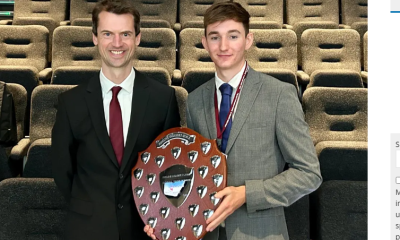Uncategorized
‘This language belongs to us. I want it back’: Scottish Gaelic revival spans North America

A standard Scottish Gaelic greeting is “How are you?”
This is a common statement made by people studying and instructing in endangered languages.
Even though the language is frequently connected to Scotland and Nova Scotia, it is also celebrated in other parts of North America, such as Washington, New York, Texas, and North Carolina, as well as Canadian towns like Toronto and Vancouver.
In various sections of the continent, a number of Gaelic organisations are working to preserve the language.
“We own this tongue. I’d like it returned. And I don’t think I’m alone in that,” Toronto’s Gaelic Society member Trish MacNeil remarked.
A decline in speakers of Gaelic
With the wave of Scottish immigrants from the late 1700s to the mid-1800s, the language of Scotland was extensively spoken throughout Canada. It ranked as the third most spoken European language in Canada in 1867, the year of Confederation.
The Canadian government discouraged the use of Gaelic and, occasionally by physical punishment, stopped school-age children from learning or using the language.
The language eventually became less common in Canada. According to the 2021 Canadian Census, there are just 2,170 Gaelic speakers remaining in Canada, compared to the previous estimate of 250,000 speakers.
There is now much more need to save the language from extinction due to the sharp decline. An increasing number of people in North America are keen to study and teach Scottish language because of strong familial ties and intense allegiance to their history.
Initiatives to bring the language back
“My family is proud to be Highlanders,” stated Jamie MacDonald, a retired professor from St. Francis Xavier University in Antigonish, Newfoundland, who taught Celtic Studies.
People from all over the world attend these events, including John David Gressett, a Gaelic teacher from Texas.
Gressett learned that he was descended from Scotland’s first king. He learnt the language of his forebears from visiting native speakers during Scottish gatherings and festivals throughout the state.
He eventually took it upon himself to teach Gaelic. Currently, he is among the few Gaelic speakers in Texas as well as the only one who travels from festival to festival teaching Gaelic and encouraging its use. He is searching for someone to replace him at the age of 73.
“I intend to make an effort to find a replacement. Thirty years from now, I won’t be here,” Gressett declared. However, I’m going to attempt to make
coordinated initiatives to support the endangered language
In Nova Scotia, there is a deliberate attempt to encourage the study and usage of Gaelic, spearheaded by the provincial government, educators such as Gressett, and volunteers.
The government has contributed to the funding of more than a dozen Gaelic-based initiatives, and in 2021 it spent $1.9 million to establish a Royal Cape Breton Gaelic College satellite campus in Mabou, Nova Scotia.
Lewis MacKinnon, executive director of the province Gaelic Affairs office, stated, “We need all partners to help with reclamation, renewal, healing, all of these pieces.” “Government in my view is central as part of that work.”
coordinated initiatives to support the endangered language
In Nova Scotia, there is a deliberate attempt to encourage the study and usage of Gaelic, spearheaded by the provincial government, educators such as Gressett, and volunteers.
The government has contributed to the funding of more than a dozen Gaelic-based initiatives, and in 2021 it spent $1.9 million to establish a Royal Cape Breton Gaelic College satellite campus in Mabou, Nova Scotia.

Lewis MacKinnon, executive director of the province Gaelic Affairs office, stated, “We need all partners to help with reclamation, renewal, healing, all of these pieces.” “Government in my view is central as part of that work.”
“I realised that having all that culture around me growing up created a very short bridge to the language,” MacNeil stated. “From there I’ve been given this super foundation and the language was just there waiting for me and I have been with it ever since.… It just completed things for me.”
Tartan Army
Can Tartan Army help us steal an international march?

Scotland’s Capital can profit greatly from football, but we run the danger of losing out, according to a report.
Although Scotland’s football players were unable to advance past the final stage in their attempt to create history at Euro 2024, their supporters achieved an incredible soft-power triumph that may have favourable effects for many years to come.
Not even the most powerful dignitaries, the most devoted followers, or Steve Clarke’s team of gifted and honourable footballers could match what Scotland’s renowned Tartan Army has accomplished.
A country, a large, significant one, has developed a deep affection for Scotland. Three German cities were visited by Scotland’s supporters: Munich, Cologne, and Stuttgart. All three expressed gratitude to their guests and expressed sadness when they had to depart.
Simply put, “We love you Scots” was the headline in Cologne’s best-selling daily, the Kolner Stadt-Anzeiger. The Tartan Army’s history was published by the German online news outlet Blick with the headline, “The history of the friendliest army in the world.”
Additionally, Henriette Reker, the mayor of Cologne, tweeted: “Dear Scots, it’s been a great couple of days spending time with you. As mayor, I could not be happier. Your return to Cologne is always welcome!” Top authorities close to Munich mayor Dieter Reiter concurred, saying, “Scotland’s fans have been so impressive.” We’re thinking about how to recognise this.

Best of all, the well-rested ranks of the 200,000 who travelled have delighted regular Germans just as much. So much so that two people, Max Kirchi and Vert Stabs, have started a petition asking the two football governing bodies of the countries to hold an annual friendly between them. Hundreds of people were signing the Change.org petition every hour, putting it well on its way to reaching its 25,000 signature goal as of the time of writing.
All of this occurred only a few days after a group of specialists convened in Edinburgh to talk about a study that examines how and why football may have a much greater and more significant impact on the daily lives of people in our country and its capital. A group of scholars and professionals led by Professor Grant Jarvie of the University of Edinburgh Academy of Sport think tank wrote “Edinburgh Futures, Football and the City.”
St Helens
Police called to street in St Helens after car ‘hit parked vehicle’ in St helens

POLICE attended a residential street after a car crashed into a parked vehic
le.On Tuesday, July 2, just before 7:30 p.m., police were called to Newlands Road in Haresfinch.
Gateshead
Exeter City Confirm Gateshead youngster move deal done

The 24-year-old had played a crucial role for Gateshead last season, helping the club to secure a play-off place as well as being apart of their FA Trophy journey, which led to the club winning via penalties at Wembley Stadium last month.
But as he approaches a transfer to League One team Exeter City, currently coached by Gary Caldwell, his time at the National League team appears to be coming to an end.
How did Francis fare last season?
Since joining the National League team from Notts County last summer and their subsequent promotion to the EFL, the midfield player has been a mainstay.
Francis played in 40 league games for Gateshead the previous season, but an injury kept him from making an appearance at Wembley Stadium.

Considering his detailed stats, Francis averaged 9.2 ball recoveries, 4.2 interceptions, and an 89% throwing success rate per ninety minutes during the National League season.
Francis played for a very successful Gateshead football team, led by Rob Elliott, who averaged the greatest ball possession percentage in the division (62%), along with 500 accurate passes each game.
Gary Caldwell will be very pleased with his ball-handling skills as he attempts to assemble an Exeter City team that can play effectively in League One next year.
Journalist Pete O’Rourke claims that the two teams have now agreed on an undisclosed amount for the midfield player. A physical examination and personal conditions agreement will probably come before the transfer to the football club is officially confirmed.
-

 Rotherham United2 months ago
Rotherham United2 months agoCardwell in, McCart out: The dream start to Rotherham’s summer transfer window
-

 Lincoln City2 weeks ago
Lincoln City2 weeks agoCharlton Athletic agree contract deal with Lincoln City
-

 Totton2 weeks ago
Totton2 weeks agoTotton Man found dead in stolen car
-

 Featherstone Rovers3 weeks ago
Featherstone Rovers3 weeks agoFeatherstone Rovers Chairman’s claim
-

 Totton2 weeks ago
Totton2 weeks agoPolice found dead body of missing Totton woman
-

 Kilmarnock1 month ago
Kilmarnock1 month agoPolice close down Kilmarnock road this morning
-

 Wakefield Trinity4 weeks ago
Wakefield Trinity4 weeks agoWakefield Trinity boss statement to fans after Wembley experience
-

 Sheffield United2 months ago
Sheffield United2 months agoSheffield United welcome new experienced 27-year-old to the defence



